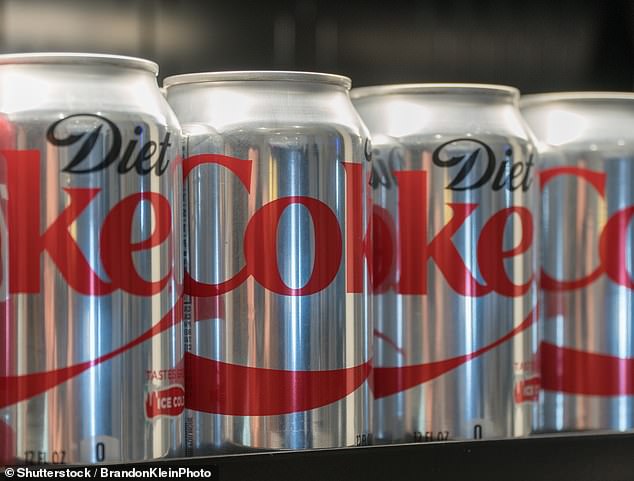[ad_1]
Children who consume a diet packed with sweeteners may be at higher risk of reaching puberty earlier, concerning research suggests.
Commonly-used sweeteners including aspartame, found in drinks like Diet Coke and products like Extra chewing gum and Muller Light yoghurts as sugar alternatives, have long been linked to certain cancers and heart issues.
But now, Taiwanese experts have found that high levels of the additives could also trigger central precocious puberty—where the first signs of puberty emerge far earlier than normal, typically before the age of eight in girls and nine in boys.
Higher consumption of ‘added sugars’, meaning those above the natural content of a food or drink item, was also linked with an earlier puberty.
Experts said the study—one of the first of its kind—showed how sweeteners had a ‘surprising and powerful impact’ on children’s development.
Previous studies have warned that starting puberty at a very young age may increase the risk of other health conditions including depression, diabetes and even cancers.
Dr Yang-Ching Chen, study co-author and an expert in nutrition and health sciences at Taipei Medical University, said: ‘This study is one of the first to connect modern dietary habits—specifically sweetener intake—with both genetic factors and early puberty development in a large, real-world cohort.
‘It also highlights gender differences in how sweeteners affect boys and girls, adding an important layer to our understanding of individualised health risks.’

Commonly-used sweeteners including aspartame, added to Diet Coke and products like Extra chewing gum and Muller Light yoghurts, have long been linked to certain cancers and heart issues

Doctors have not been able to identify a single or even a handful of causes for precocious puberty, though experts have previously told MailOnline that some underlying factors include obesity, stress, and genetics
In the study, the scientists assessed 1,407 Taiwanese teens, who undertook diet questionnaires and urine tests, and discovered 481 had undergone early puberty.
They found the artificial sweetener sucralose showed a stronger link with early puberty in boys, while aspartame, glycyrrhizin and regular added sugars showed a stronger link in girls.
Experts also found the risk was most pronounced in those who already had a genetic predisposition towards an earlier puberty.
The study was presented at ENDO 2025, the Endocrine Society’s annual meeting in San Francisco, and has yet to be published in full.
But common limitations of diet studies include the fact eating habits are often self-reported.
Sucralose is made from normal sucrose table sugar but is chemically altered so the body doesn’t process it as a carbohydrate, meaning that it contains no calories.
It is the main ingredient in the Canderel sweetener. Glycyrrhizin, on the other hand, comes from liquorice roots and is a natural sweetener.
Previous research from the same team found that some sweeteners can affect the release of puberty-related hormones.

The risk was most pronounced in those who already had a genetic predisposition towards an earlier puberty

Particular products containing aspartame — which entered the market in the 1980s — include Diet Coke, Dr Pepper as well as Extra chewing gum and Muller Light yoghurts. Some toothpastes, dessert mixes, and sugar-free cough drops also contain it
They said the chemicals were having this effect by influencing the function of cells in the brain or by altering the make-up of bacteria in the gut.
Concerns about the impact artificial sweeteners, which are added a plethora of products to make them TAST sweet with fewer calories, could be having health, including its cardiovascular impact, have circulated for years.
But critics highlight such studies are only observational, meaning they are unable to prove artificial sweeteners are the culprit and cannot rule out other external factors being to blame.
Fears have also been raised about links between artificial sweeteners and cancer.
These worries were heightened in 2023 after the World Health Organisation controversially classified the artificial sweetener aspartame, found in drinks like Diet Coke, as ‘possibly carcinogenic to humans’.
However, the UN agency ruled it only posed a risk to those who consumed massive amounts and that an 11 stone (70kg) adult could safely drink about 14 cans a day.
A growing body of research also suggests that girls who go through puberty at earlier ages could be at risk for health issues later in life.
One 2023 US study found that girls who started their period before the age of 13 were at a higher risk of developing type 2 diabetes and suffering strokes in adulthood than their peers who began menstruating later.
Another, published in the Lancet, found that girls who started their periods at early ages were at an increased risk of breast cancer.
Experts have put the surge in girls starting puberty younger down to the ongoing obesity crisis, with fat cells containing hormonal properties triggering puberty at a younger age.
[ad_2]
This article was originally published by a www.dailymail.co.uk . Read the Original article here. .

